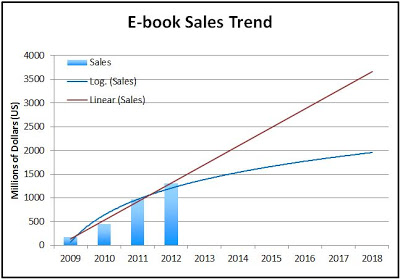 |
| Photo by me. I’m on Instagram! |
This week in the books!
Thank you so much to everyone who participated in the #ThankAWriter project! Maggie Mason posted a recap, including how her first letter to Thomas Lynch resulted in an amazing gift from the author, some of the excerpts from the letters, and the winner of the first six books in the Penguin Dropcap series. It’s never too late to participate if you haven’t gotten around to writing your letters.
Meanwhile a very busy couple of weeks for me as I spent some of last week in San Francisco for work, but I was able to snag a few links from the last couple weeks for your enjoyment:
Reader Greg Peisert took the data from my post yesterday about how e-book sales are still on the rise and added very helpful linear and logarithmic trend lines to see where we might be headed. Chances are somewhere between these two lines:
Very cool!
Adam Johnson, who won the Pulitzer Prize in fiction for The Orphan Master’s Son. Talk about living the dream for an author.
Other winners:
Drama: Disgraced by Ayad Akhtar
History: Embers of War: The Fall of an Empire and the Making of America’s Vietnam by Fredrik Logevall
Biography: The Black Count: Glory, Revolution, Betrayal, and the Real Count of Monte Cristo by Tom Reiss
Poetry: Stag’s Leap by Sharon Olds
General Nonfiction: Devil in the Grove: Thurgood Marshall, the Groveland Boys, and the Dawn of a New America by Gilbert King
Congrats to all the winners!
Author David Gaughran wrote a provocative post about distribution service Argo Nevis, which many top literary agents offer their clients as a self-publishing option. Does it provide a good deal for authors? Gaughran concludes no. The comments section is very interesting, and I left my thoughts there as well.
Lots of writers belong to writing groups. But how many people have to cross a military checkpoint to visit theirs? Reader Nora Lester Murad shared a really great video of her writer’s group in Ramallah, Palestine.
Chuck Sambuchino has a great round of advice from agents about what not to do at the beginning of your novel.
Actor Jason Segal landed a book deal for a middle grade series.
GalleyCat rounded up some writing advice for aspiring children’s book authors.
And Maggie has an awesome roundup of homemade gift ideas for Mother’s Day.
Meanwhile, don’t forget about the Forums! If you ever want to ask me a question, connect with writers, or spill what’s on your mind, that’s the place to do it.
And finally, with the playoffs upon us, I couldn’t get enough of Shaq’s NBA bloopers of the year:
Have a great weekend!




Enjoyed the Sambuchino link. And every writer should probably read through the entry thread of at least one of your 1st paragraph contests. Eye opening, to say the least.
Also, a while back I purchased The Orphan Master's Son for myself and The Snow Child for my wife. I'm pretty sure the Pulitzer people should hire me. My fee would be very modest.
I loved the discourse between you and the mustached one. I'm glad to hear you're going to indie-publish your next book. That little bit on news gave me that final nudge into self-pubbing my own work. Thanks, Nathan.
Ahaha! Thanks for the bloopers link–basketball's been too painful to watch in Phx this year. Love the one violating 3-second rule to tie his shoe 🙂
I am not a fan of basketball but enjoyed the bloopers from your link!
Wow, great photo, Nathan. You're talented.
I also liked the chart by Greg.
Your link to the Galley cat is missing, btw.
It was cool to see you join the discussion at David's oustanding post (he is like an investigative reporter now. Very cool). I think your point about a place for curated fiction is well-said, although it may not always be a popular idea. But curation and discoverability are definitely something to think about. I do wonder, though, if agents and publishers names will foster reader trust. It might be better to have curated works with a popular writer headliner – some short story collections do that now, to introduce debut writers.
My re. Argo, I worry the choice is not lazy, it's deliberate. Asking your client to give up 30% of their income to an unproven distributor just so the agent can remain relevant and in control would be completely unethical. I don't like it at all. I hope that the agencies involved re-think this, and I hope David's information spreads to writers so they can make informed choices.
I agree with Mira.
The entire concept of self-publishing is to get rid of the gatekeepers. And self-published authors really need to get an organization or something going to keep agents/publishers from controlling the self-publishing industry. There are a lot of sneaky things going on right now. A lot worse than charging reading fees were in the past.
Guys, reputable agents aren't going around tricking people. There's more transparency than ever, and agents provide a lot of value. I'd argue there are fewer scams than ever now that everyone is much better informed.
The only reason they'll still exist is if they're useful and earn the author more than they're paid. Right now they definitely are.
@ Nathan –
Agents do provide value, but only to their clients who want to publish traditionally. When a writer self-publishes, they can choose to leave agents out of the loop altogether.
An option like Argo lets agents remain in the loop, but only by recommending an unproven option to their clients that will cost them an additional 30% of their income. That is not helping the author earn more!
As I said before, I don't know if agencies are doing this out of motives of self-interest, but I am worried that they are. Even with good intentions, group think in the corporate world can get tricky when agencies are worried about survival.
That is why I think it's important to question corporate decisions, even if the agencies are reputable. I think it is appropriate to bring public scrutiny to bear, if only to get the agencies to re-look at what they are doing, and to inform writers who may be affected.
Mira-
In this marketplace the only reason agents can and will exist is if they add value. I think it's patronizing for people out there to believe that the reason authors who are embarking on self-publishing programs with agents are doing so because they've been hoodwinked or are lazy or ignorant. I don't know a serious author (and if you have reached the point of having an agent your'e a serious author) who takes a single decision in their career lightly.
There is no one way to publish a book. There are valid new publishing models, including self-publishing models, that do and will involve agents.
Nathan –
I think that most agented authors will trust their agents. If their agents recommend going through a particular program to self-publish, I think most authors would simply assume that the agent has their best interest in mind.
Which is appropriate. Agents are supposed to be trustworthy and work for the best interest of their clients. Writers should not have to second guess their agents. It is the agent's job to be ethical and seek out the best 'deal' for their client.
In terms of your second point, I agree. There may be self-publishing models that will include agents successfully. I think there is a need for that, actually. Some authors prefer guides and mentors, which is fine. I think agents can fill those roles well.
But Argo is not one of those valid options. It takes a huge percent of the writer's income for very little return. I would also argue that any program that literally refuses to deal with the author – that will only deal with the agent, like Argo – is suspect, in terms of its basic goals.
The NBA is so awesome right now.
The Lakers are out of the playoffs.
We have an openly gay player, and almost every other prominent player has his back.
Seattle might be getting a team again.
The Knicks matter.
Golden State, Denver, the Clippers, and Memphis are playing two of the most exciting series in a while. I can repeat this one, if necessary.
Anyway, off to read some links.
Matt:
AND THE KINGS ARE STAYING!!
Damn you. I hadn't heard.
And fascinating stuff about AN! A great back and forth with you and David, and then things really picked up when the author of his examples chimed in.
Thanks, Nathan! The Gaughran article is thought-provoking, as are the comments.
In one comment, Gaughran says “Authors get such a high percentage of self-published royalties because there are less people in the middle taking a cut.” While that is true, the other side of that coin is that the reason there are fewer “people in the middle” is because the author is doing the work him/herself. So, that got me thinking… when an author self-publishes and receives a much higher return per book, does that mean that the “author” is actually getting a higher “royalty”?
If Jane Doe writes a book and self-publishes it, Jane Doe is now not only the author, but also the publisher, marketer, designer, etc. If that’s the case, any money Jane makes on the sales of her book cover the “wages” of at least four different jobs. I suppose one would need to divide up the time Jane spends working on the publishing side of her book vs. the writing side to find out if her “royalty” is higher. I suspect it probably still is (at least in most cases), and certainly there are other reasons why one would want to self-publish (aside from the monetary benefit), but that extra income does not come freely.
I’m sure there are going to be exceptions. And with e-publishing some of those costs and demands on time are omitted. Also, I know most authors still have to market their books even if they go with a traditional publisher. But still, when one self-publishes, they do take on multiple jobs, and their higher monetary return should reflect that.